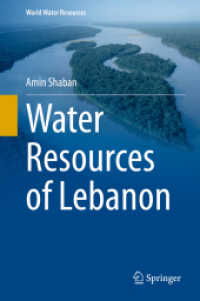- ホーム
- > 洋書
- > 英文書
- > Architecture
Full Description
Analyses contemporary Turkish social and political transformation from 2010 to 2020 through the urban landscape of Istanbul
Analyses contemporary Turkey through the series of these key events, especially as they relate to the recent history of Istanbul
Uses an interdisciplinary perspective that incorporates the intersection of religion, politics and space through attention to architecture and the urban landscape
Adopts an accessible but rich interpretive method that covers a wide range of political and religious issues crucial to understanding Turkey's most recent history
Provides an original analysis of the decade of 2010-2020 in contemporary Turkish history through a series of case studies of the decade's key events
Uses an interdisciplinary perspective that incorporates the intersection of religion, politics and space through attention to architecture and the urban landscape
Utilises an accessible but rich interpretive method that covers a wide range of political and religious issues crucial to understanding Turkey's most recent history
Over the past decade, the AKP, under the leadership of Recep Tayyip Erdogan, has decisively turned Turkish politics in the direction of conservative Turkish Islamic national identity. Through an analysis of four case studies - the 2010 designation of Istanbul as the European Capital of Culture, the 2013 Gezi Park protests, the association of the first Bosphorus bridge with the 2016 coup attempt, and the transition of Hagia Sophia from museum to mosque in 2020 - the book identifies key moments of change and describes how the AKP has restructured public spaces in Istanbul to reflect its values.
This book explores the momentous shifts in power during a crucial decade in Turkish history, 2010-2020, by analyzing how these events have produced shifts in the physical landscape of Istanbul. Through an analysis of four case studies, the book focuses on the role of the Turkish state under the AKP in the restoration of conservative Islamic and Neo-Ottoman imagery and iconography in public space through the intentional transformation of architecture and the built environment. A specific ideological framework undergirded the AKP's conception of the built environment, the plans it implemented to transform it, and the forms of resistance that these plans generated. This specific ideological framework is here termed Erdo?anian Neo-Ottomanism, which describes AKP's use of the power of the state to shape the urban landscape in their social and ideological image. This phenomenon is the subject of this book's analysis.
Contents
Acknowledgments
Abbreviations and Selected Technical Terms
Introduction
Chapter One: Turning Points: Theory, Background, and Methods of Analysis
Chapter Two: Istanbul as European Capital of Culture, 2010: The AKP's Final Turn
Toward Europe
Chapter Three: Gezi Park, 2013: Protesting and Resisting the AKP
Chapter Four: The Station of the Martyrs, 2017: Memorialization and Consolidation of the
AKP
Chapter Five: The Reconversion of Hagia Sophia, 2020: Final Conquest and Victory of the
AKP
Conclusion
Bibliography
About the Authors
Endnotes







